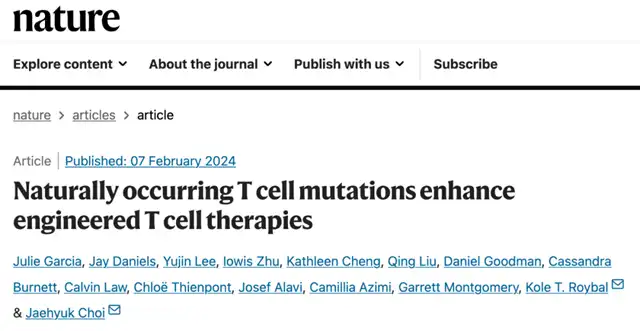Natural Gene Mutation in Cancer Boosts CAR-T Cell Anti-Cancer Ability Hundredfold
- Normal Liver Cells Found to Promote Cancer Metastasis to the Liver
- Nearly 80% Complete Remission: Breakthrough in ADC Anti-Tumor Treatment
- Vaccination Against Common Diseases May Prevent Dementia!
- New Alzheimer’s Disease (AD) Diagnosis and Staging Criteria
- Breakthrough in Alzheimer’s Disease: New Nasal Spray Halts Cognitive Decline by Targeting Toxic Protein
- Can the Tap Water at the Paris Olympics be Drunk Directly?
Natural Gene Mutation in Cancer Boosts CAR-T Cell Anti-Cancer Ability Hundredfold
- Should China be held legally responsible for the US’s $18 trillion COVID losses?
- CT Radiation Exposure Linked to Blood Cancer in Children and Adolescents
- FDA has mandated a top-level black box warning for all marketed CAR-T therapies
- Can people with high blood pressure eat peanuts?
- What is the difference between dopamine and dobutamine?
- How long can the patient live after heart stent surgery?
Natural Gene Mutation in Cancer Boosts CAR-T Cell Anti-Cancer Ability Hundredfold
CAR-T cell therapy has emerged as a revolutionary treatment for cancer. Since 2017, the U.S. FDA has approved six CAR-T cell therapies for treating hematologic malignancies, showcasing impressive therapeutic outcomes.
However, while CAR-T cell therapy has shown remarkable efficacy against hematologic cancers, its effectiveness against solid tumors, which represent 90% of all cancers, has been lacking. Therefore, enhancing the efficacy of CAR-T cell therapy in solid tumors has been a pressing challenge.
On February 7, 2024, a team led by Jaehyuk Choi from Northwestern University and Kole Roybal from the University of California, San Francisco, published a research paper titled “Naturally occurring T cell mutations enhance engineered T cell therapies” in the journal Nature.
Employing a strategy akin to “learning from the enemy,” the study investigated malignant T cell gene mutations causing lymphoma. These naturally occurring, unique mutated genes were then integrated into CAR-T cells, resulting in a more than 100-fold increase in their ability to kill cancer cells, without any toxic side effects or cancer-promoting risks. This breakthrough opens new avenues for CAR-T cell therapy in treating solid tumors!

CAR-T cell therapy has revolutionized the treatment landscape for hematologic cancers. However, in solid tumors and drug-resistant hematologic malignancies, this cutting-edge therapy has been limited by various factors, including poor in vivo persistence, immune-suppressive microenvironments, and T cell exhaustion.
Interestingly, while artificially engineered CAR-T cells exhibit poor sustained combat capabilities, malignant T cells responsible for lymphomas can persist in the body. Adhering to the adage “learn from the enemy,” malignant T cells likely possess a special genetic mutation that grants them robust vitality. If this genetic code could be incorporated into CAR-T cells, could it potentially harness the “strengths of cancer” to combat cancer’s chaos?
To validate this hypothesis, the research team screened for adaptive mutations occurring in T cell tumors, generating a gene library comprising 71 mutations and 45 wild-type controls. Subsequently, they integrated these mutations into human and mouse T cells, then evaluated their impact on T cell phenotypes both in vitro and in vivo.
In CD4+ cutaneous T cell lymphoma, the team discovered a unique gene fusion – CARD11 and PIK3R3, termed CARD11-PIK3R3. CAR-T cells carrying this genetic mutation significantly enhanced AP-1 and NF-κB signal transduction, interleukin-2 (IL-2) production, and tumor-killing effects in vitro and in vivo.
Further research indicated that CARD11-PIK3R3 enhanced the CARD11-BCL10-MALT1 complex signaling pathway in an antigen-dependent manner, promoting CAR-T cell anti-tumor efficacy in several immune therapy-resistant tumor models while exhibiting sustained tumor-killing activity.
Moreover, CARD11-PIK3R3 substantially reduced the therapeutic dosage of CAR-T cells. Conventional CAR-T therapy typically requires millions of CAR-T cells to treat cancer in mice, but with the integration of the CARD11-PIK3R3 gene mutation, only 20,000 novel CAR-T cells were sufficient to eradicate tumors. In essence, CARD11-PIK3R3 boosted CAR-T cells’ ability to kill cancer cells by 100-fold.
Benefiting from such potent anti-tumor killing effects, this new technology reduces the demand for CAR-T cell dosage and alleviates the stringent requirements for lymphocyte depletion preconditioning. Importantly, after 418 days of treatment, CAR-T cells expressing CARD11-PIK3R3 showed no signs of malignant transformation, demonstrating the safety of this new technology in vivo.
In summary, this research published in Nature demonstrates that a naturally occurring gene mutation found in lymphomas – CARD11-PIK3R3 – enhances CAR-T cells’ anti-solid tumor effects hundredfold. These findings also suggest that judicious use of naturally occurring gene mutations may pave the way for improving T cell immunotherapy.
Notably, Jaehyuk Choi and Kole Roybal have founded a company named Moonlight Bio. Both first authors of the paper have joined the company as founding scientists. Moonlight Bio aims to utilize naturally occurring T cell adaptive mutations to enhance T cell therapy’s poor persistence, T cell exhaustion, inadequate T cell infiltration, and other issues. They hope to advance to human clinical trials within two to three years.
Natural Gene Mutation in Cancer Boosts CAR-T Cell Anti-Cancer Ability Hundredfold
Reference Links:
https://www.nature.com/articles/s41586-024-07018-7
https://www.nature.com/articles/d41586-024-00305-3
(source:internet, reference only)
Disclaimer of medicaltrend.org
Important Note: The information provided is for informational purposes only and should not be considered as medical advice.



